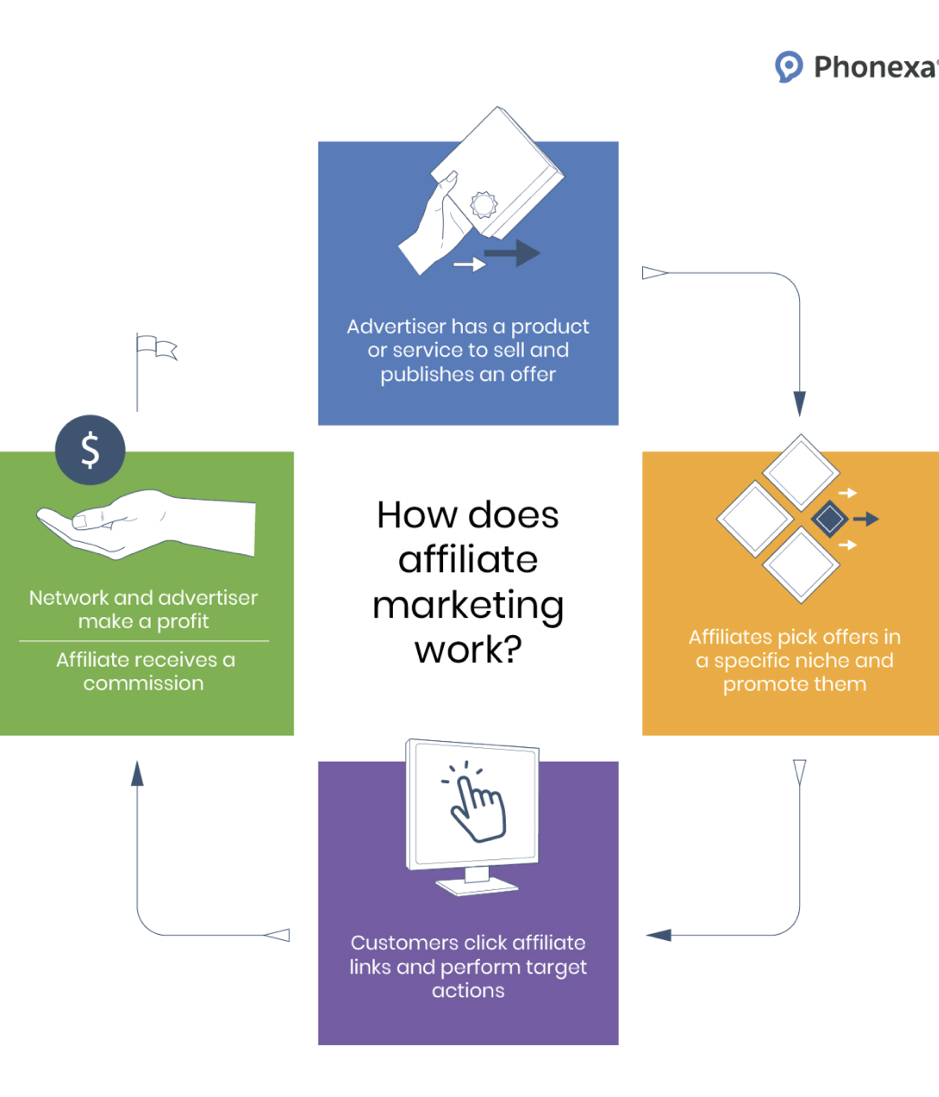Affiliate marketing has long been a highly effective and lucrative digital marketing channel, but technological advances in artificial intelligence and machine learning have the potential to revolutionize the industry. By analyzing data and automating tasks, Al and ML are streamlining processes for both affiliates and merchants, increasing sales, and enhancing the overall customer experience. From Al assistants to enhanced targeting and personalization, discover the cutting-edge tools and strategies that are shaping the future of affiliate marketing.

How Al And Machine Learning Are Revolutionizing Affiliate Marketing
Affiliate marketing is being transformed by Artificial Intelligence (AI) and machine learning. These technologies are making an affiliate program better in terms of personalized content, optimized partnerships, and the right affiliate-advertiser match.
Al and machine learning are tools for obtaining a better perspective on customers’ experiences, behavior, and preferences. Based on the analysis of big data sets, AI can identify patterns to come up with the content types, offers, and products that work best for different target groups. After that, affiliates will be able to customize their websites and their marketing campaigns to show the most relevant content for each visitor. Using this data-driven personalization process, the conversion rates and sales revenues will be improved.
Al is also working on affiliate recruitment and management in the previous point. Some ML algorithms look at the affiliate’s attributes such as audience, traffic, and performance to pick out the best matches for certain advertiser programs. Nowadays, machine learning is employed by affiliate networks to get valuable information about the top affiliates for them.
On the other side, AI and machine learning are giving affiliates the ability to find the finest and most profitable programs to promote. Affiliates can enter any data about their website, audience, and objectives which will then be provided to the machine learning model which will subsequently produce suggestions of suitable programs and advertisers that the affiliates can partner with. Al considers aspects like commission rates, ad type, credibility of the advertiser, and so on to come up with the best match for your needs.
Traditional affiliate marketing was based on the basic methods of tracking and tended to be inaccurate and full of transparency issues. Yet the emergence of advanced affiliate link tracking solutions has changed the stage. AI and ML-based tools have opened a new chapter, offering marketers a wealth of valuable insights and up-to-date information.
Proper link tracking software for affiliates is a key element in a campaign’s success. AI-driven link tracking affiliate software goes beyond mere click counting, offering the following features:
- Attribution Modeling: AI algorithms associate conversions with specific touchpoints in the customer journey thus establishing a better representation of the effect of each affiliate link.
- Predictive Analytics: With its ability to predict future trends and behaviors based on historical data, machine learning enables marketers to make proactive adjustments for maximum efficiency.
- Dynamic Link Optimization: AI can automatically adapt affiliate link marketing according to user behavior, guaranteeing that visitors obtain the most appropriate content by their choices.
Thus, learn how to track affiliate links and boost affiliate marketing for your business.
Real-World Applications of Al and ML in Affiliate Programs
Affiliate marketing relies heavily on data to optimize programs and increase sales. Al and machine learning have opened up new ways to leverage data to improve the affiliate experience for both merchants and affiliates.

Individualized Product Recommendations
Al-powered recommendation engines can suggest highly relevant products to share with audiences based on their interests and buying behaviors.
Affiliates benefit from higher click-through and conversion rates by promoting products their followers are most likely to purchase. Merchants gain more qualified leads and customers.
Automated Bidding and Budgeting
machine learning algorithms can be used to optimize bidding on affiliate traffic and budget allocation. The algorithms consider factors such as conversion rates, margins, and lifetime customer value to figure out optimal bids and budgets for the affiliate partnerships. At this level of automation, the workload is reduced, and the budget is spent only on the most prosperous affiliates and traffic sources.
Personalized Affiliate Recruitment
Finding the right affiliates and working with them is the most crucial part of a successful affiliate program. Al offers targeted affiliate recruitment for affiliates that are audiences collected from a brand’s customer list. Machine learning algorithms analyze affiliate websites and social media to identify potential good targets within the program that would be worth a dedicated outreach program. A personalized recruitment strategy increases the quality of affiliates and saves the time spent.
Transparent Reporting
One of the significant advantages of incorporating AI and ML in affiliate marketing is implementing affiliate link tracking software for transparent reporting. This allows for figuring out clear and understandable reports. Synoptic algorithms are capable of processing huge volumes of information, allowing for highly detailed reports on the efficiency of the marketer’s affiliate links. This transparency aims at empowering clientele in decision-making, making marketers optimize their strategies for better results.
Lead Management
Among other strong points of using Al in affiliate programs is affiliate lead generation. AI as well as ML are very much essential to formulate augmented affiliate lead-generation tactics. Through the analysis of user behavior, these technologies can find potential candidates with precision. The AI-driven lead scoring automation enables the marketer to focus on the most valuable leads, improving the effectiveness and accuracy of conversion.
The Future of Al and Affiliate Marketing: What’s Next?
The use of Al and machine learning in affiliate marketing is still in its infancy but is poised for tremendous growth over the next decade. As Al systems become more sophisticated and data sets grow larger, Al will transform how affiliates operate.
Affiliate marketing programs powered by AI immerse themselves in myriads of data to identify the most impactful findings and refine the campaigns. All will improve the affiliates’ capacity to identify the right audiences by analyzing their customer attributes, behaviors, and past responses. Affiliates can target users more precisely and offer them individually tailored content and privileges by knowing them better.
an additional aim of Al is to enhance campaign optimization. Machine learning algorithms can perform thousands of tests to see which messaging, offers, and creatives will produce maximum effect on each customer. Due to this partners will see in real-time what brings success and what doesn’t, so the optimization speed will increase.
Chatbots and virtual assistants will allow retailers to put customers first and engage them in a more personalized way. Al-based tools can talk like a human, give answers, and provide recommendations about appropriate products or services. With time, artificially intelligent assistants will be able to help affiliates complete tasks like email marketing, social media posting, and data analysis.
The integration of artificial intelligence and machine learning into affiliate marketing is an ongoing process that has the potential for further innovation. As technology continues to evolve, we can expect even more advanced affiliate link tracking that will give marketers unprecedented control and insight into their campaigns.
To conclude, with AI and machine learning going forward, affiliate marketers can make use of further chances to improve their biz. Marketers can harness AI for tasks such as predictive analytics and automation to get deeper insights and also to have more time at their disposal to devote to strategy. Besides, machine learning techniques for recommendations and advertisements can be used to increase sales. Though Al and ML have unresolved challenges like data quality issues, they provide at the end of the day that the affiliate marketers can scale their operations, target customers more effectively, and boost revenues. Hence, being up to date with the newest developments such as affiliate program software will be the critical step to staying relevant in a competitive environment.



